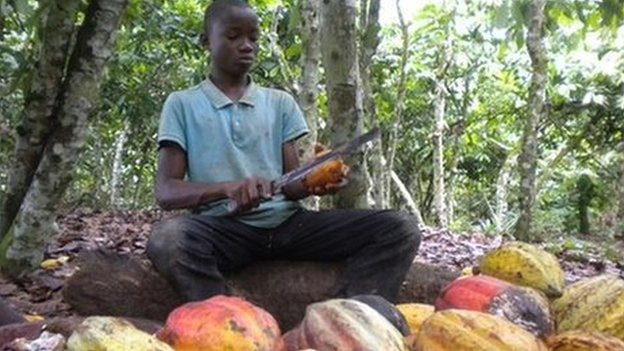Economic Empowerment
In our series of letters from African journalists, Ghanaian Elizabeth Ohene recalls how she worked on a cocoa farm as a child without stoking any controversy.

I went to a furniture shop in Ghana's capital, Accra, recently; it stocks furniture and carpets imported from Pakistan.
Displayed casually on all the furniture sets and carpets was a card with a neatly printed legend: "Carefully made in Pakistan without child labour."
Obviously, this was meant to reassure would-be customers that they could buy and use the expensive furniture and carpets without feeling any guilt that poor Pakistani children had been exploited in the manufacture of the goods.
Since I do not know very much about the furniture or carpet industry in Pakistan, I told myself I would have to take the word of the nice gentleman in the shop.
The visit to the shop has led me to an issue that I have not been able to resolve successfully for myself.
Where is the line between child labour, which everybody is against, and children helping at home and learning the skills for survival in later life?
If your mother sells cooked food on the roadside and you help to serve the customers at age 10, I wonder if your mother is guilty of child exploitation?
I think of the campaign against the use of child labour on cocoa farms in Ivory Coast and Ghana.
Indeed famous chocolate companies have been pressurized to stop using cocoa from these countries as punishment for using children on farms.
Idyllic
I have some experience of this. From age five to nine, I lived in the village with my grandmother.
She was a farmer and she used to take me to the farm on Saturdays when there was no school.
I am not quite sure how much use I was but I certainly learnt to plant cocoa and I took part in harvesting cocoa pods and preparing the seeds for drying.
I carried loads on my head, back home from the farm.
I wonder if my time on the farm could be classified as child labour?
This was my grandmother who loved me to bits and my recollections of those times were idyllic.
Obviously, I cannot compare my time on the farm with those children who are not loved or who have been trafficked.
'Housekeeping training'
I just want to make the point that not every child who goes to the farm and helps is being abused.
I recall a young Ghanaian friend of mine in London and her 12-year-old daughter.
She was doing her best to bring up her child in the way she had been brought up and that meant the child had to wash dishes, make beds, scrub the bathroom, cut up onions and learn to cook.
An English school friend of the child came to spend a weekend, saw what tasks her friend had to perform at home and before we knew it, my friend's daughter was threatening to call the social services to report her mother for child abuse.
I am afraid my friend's reaction was a bit extreme; she smacked her daughter and told her she was giving her a proper reason to call the social services.
She was not going to have a daughter who did not know how to cook or keep a house clean and she was going to send her daughter back to Ghana where mothers were free to make their daughters learn these things without interference from anybody.
The official position, as set out in Ghana's Children's Act, is that a child of 13 may do light work under supervision, while a child of 16 may be apprenticed but may not do any hazardous work until the age of majority at 18.
However, if this law were to be enforced, half the population would probably end up in jail.
But I can testify that things have changed somewhat, as I recently discovered that there are young Ghanaian girls who make it to university these days without knowing how to cook.
Indeed you can now safely have a stay in a middle class Ghanaian home and be assured that all the cooking and cleaning in the home is carefully done without child labour.
